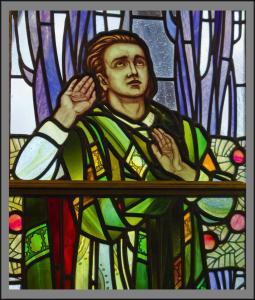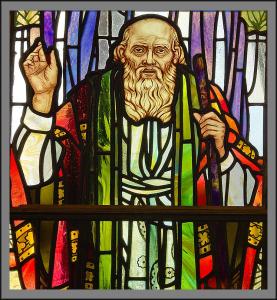(Lectionary for June 3, 2018)
And, as Monty Python were fond of saying, “Now, for something completely different.” As I have announced in this lectionary blog for some time, I have written a novel, King Saul(2014), published by Resource Publications, an imprint of Wipf and Stock. I doubt more than a handful of you have read it, though of course I hope some of you may have. It is a fictionalized account of the life and death of King Saul of Israel, along with long looks at the prophet Samuel and Saul’s successor, the infamous David. In my forward to that work, I described why I, a scholar of the Bible, and not a novelist in fact, decided to write like this at all. I will not repeat what I said there, but it may be enough to say that I did not think, and still do not think, that the world needed from me any more footnoted accounts of these amazing texts, though I surely could have provided one. I love fiction, and so I provided one of those instead.
And over the next few weeks of this blog I intend to provide short snippets of the novel, albeit not always in direct quotes, since that would be far too long. Instead, I will tell the story of the day rather than explain the story the Bible offers. And since I have been working on a sequel to the Saul book, named “King David,” I will continue these weekly stories as long as the books of Samuel are the Hebrew Bible texts for the day. The preachers who have read my novel have said to me that they found my retelling helpful for their preaching. I admit that I did not write the thing as a preacher’s helper; I wrote it because it was jolly good fun! But if it does prove helpful, well, more’s the better. Today’s text brings us the very famous call of Samuel. My account of these fabulous stories from ancient Israel is quite distinct from the typical ways they have been heard. I say that by way of warning. I hope to change your mind about the import of the stories, but again that was not my basic intention. Read and enjoy; that is what I had in mind.
The Call of Samuel
The boy Samuel gazed at the Ark of YHWH, that chest that was filled with magic and power, he had been told, but looking at it now, resting on a broken ledge in the tiny shrine at Shiloh, covered with a thick layer of dust, Samuel saw little magic or power. It looked like any old box with its cracked varnish and splitting wood. In every way, the boy saw that the glory of Israel was something far less than glorious, the temple of Shiloh a crumbling hulk of a small house, and the future of the land as uncertain as the guttering lamp, hanging loosely on the wall above his bed. He was as close to despair as the day his mother, Hannah, had left him in this wretched place so long ago.
Suddenly, a voice shattered the silence. “Samuel! Samuel!” Immediately, automatically, Samuel replied, “Here I am!” He leapt out of bed and rushed to Eli’s room. Perhaps the ancient man was ill; as he aged he was increasingly frail, and as his eyes closed in blindness, he was ever in need of some help from his young companion. There was a note of irritation in Samuel’s reply, however much he tried to sound polite; he got little enough sleep as it was without these nightly cries from the old man.
“I’m here; you called me,” he said entering the fetid room, putrid with the stench of Eli’s body. The priest became less interested in his own cleanliness the older he became, and his odors were appalling, his bed often overrun with lice and maggots. Samuel had spent more than a few nights cleaning up after Eli’s nocturnal emissions since he was less and less able to control his body.
But Eli said, pointing his toothless mouth at the sound of Samuel’s voice, “I did not call; go and lie down.” Samuel trudged sleepily back to his bed. But the voice came again. “Samuel! Samuel!” it said with increased urgency. Samuel, his anger rising, stomped toward Eli’s room, ready to berate the slobbering fool, but shouting once again with a stifled politeness, “Here I am; you called me.” “I did not call. My son; go and lie down.” Samuel wanted to reply that Eli had become so addled that he did not know what he was saying, but left the rank room in silence.
No sooner had he settled in his bed when the voice came a third time, even louder. “Samuel! Samuel!” Once again, the exhausted boy got up and went back to Eli’s room, and through clenched teeth said, “I’m here; you called me!” This time the old man paused before replying, and finally said, “Go and lie down, and if the voice comes again, say precisely this: ‘Speak, YHWH, for your servant is listening.’”
Samuel went slowly back to his room, wondering at Eli’s words. Surely the voice had been Eli’s! Often enough, the priest had shouted in his sleep, muttering incomprehensible sounds. This time, he had managed clear speech, but Samuel convinced himself that the voice had been Eli’s. But here it came again just as before. “Samuel! Samuel!” And now Samuel was terrified, but simply could not believe that the voice was YHWH’s, so instead of replying as Eli had taught, he simply said, “Speak, for your servant is listening,” being careful not to name the voice as divine. But to his horror, it soon became all too clear that YHWH was indeed speaking to him, to Samuel, to the boy apprentice in Shiloh. And more than that, what YHWH was demanding he do was nothing less than terrible.
“I am about to do something in Israel that will make both ears of anyone daring to hear it tingle. On the day when I act I will do everything I said I would do to the house of Eli. I am about to punish him and his family and all his relations, because he knew all the evil of his disgusting sons, who spend their lives blaspheming me, and did not do enough to restrain them. As a result, there are not enough sacrifices, not enough prayers, not enough sacred vows to assuage my fury against all of them, and that fury will never be quenched but will forever rage and rage and rage!”
And with that final “rage” trembling in the air, the voice was stilled, and Samuel was stunned. YHWH was infuriated beyond calming! What was Samuel to do? The truth was that YHWH had not asked him to do anything. YHWH merely raged. Samuel lay all night in quiet and pondered. In the morning, Eli confronted him, even though Samuel tried to stay out of the priest’s way. “Tell me everything that YHWH said,” Eli demanded, and so Samuel did. With his last shred of dignity, ancient Eli, the priest who had served his God for his entire life, said with full resignation in his voice, “It is surely YHWH who does whatever YHWH wishes to do.” Eli had never uttered a clearer truth: YHWH did whatever YHWH wanted to do, and Samuel immediately remembered that song his mother had sung at his birth and which she had taught to him: “YHWH kills and brings to life, sends to Sheol and brings up from there.” This God acts in ways only this God could act, and there was nothing for it but to be YHWH’s messenger in the world. And so Samuel resolved that day to be to the end of his days. From that day forward, Samuel knew without doubt that he was God’s prophet, and that whatever he said were words he had learned straight from his God. There could be no argument, no contradiction, no other viewpoint. Samuel was right in all things. As long as he stayed close to the ways of his God, he could be trusted always to interpret God’s will and way. As long as he stayed close to his God…
There is the story as I hear it. It is my contention that Samuel was not finally able always to “stay close to his God,” but allowed his own personal desires to intrude into his life as YHWH’s prophet. And on that reality lies much of the excitement and tragedy of Saul’s magnificent tale.











